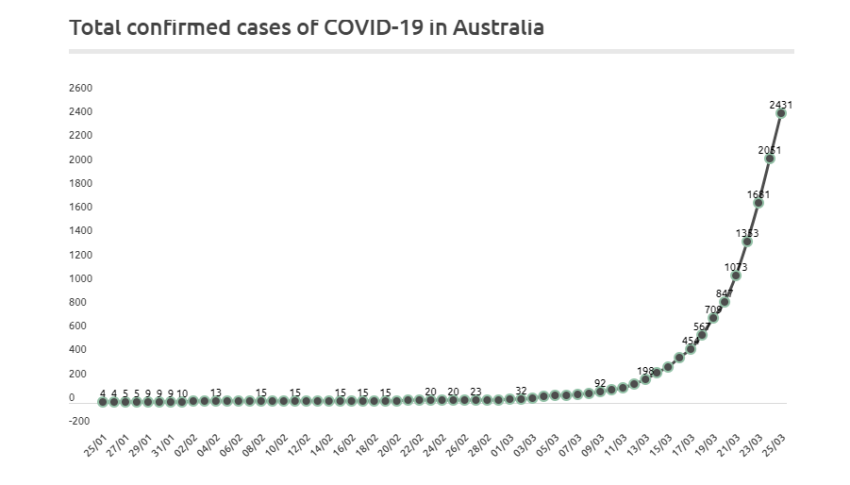
It is clear the federal government has badly mishandled the COVID-19 pandemic, with doctors now warning Australia is on track to be in a "worse position than Italy is currently in".
"On current growth rates, the 300 cases in Australia today [March 15, by March 19 it was 556] will be … 10,000 by the 4th of April," a letter by concerned doctors reads.
With each passing day the global COVID-19 emergency takes on new and more ominous proportions. The World Health Organisation (WHO) has declared it a pandemic, and several countries, including Italy, Spain and France, have gone into lockdown.
In response, Spain has nationalised its private hospitals to free up resources to deal with the crisis. As rates of infection and associated deaths rise across the world, it is highly likely that similar and more far-reaching measures will be taken in the hope of reducing the spread of the virus.
In Australia, current reported cases of infection, though lower than other places, have begun rising exponentially. But the measures Prime Minister Scott Morrison has taken to date have been primarily geared to protecting profits rather than marshalling all available resources to implement urgent and preventative healthcare measures.
While federal and state governments have not yet implemented school closures or other lockdown measures demanded by doctors and health experts, they are calling for those presenting with symptoms of the virus to self-isolate and for people to avoid unnecessary travel and contact with crowded places.
Key to being able to self-isolate, however, is to have the economic means to forgo paid work and stay at home. Decades of labour deregulation, casualisation and the growing "gig economy" mean more than a third of working people do not have paid sick leave provisions.
Absurdly, Attorney General Christian Porter said this has all been of benefit to workers, claiming that because casual workers receive a higher hourly rate, they therefore accumulate a rainy day fund which will see them through just this type of global economic and health crisis. The government's slashing of casual penalty rates puts lie to this argument.
What penalty rates exist today are compensation for irregular and insecure working conditions, nothing more. Low income workers who are sick will likely feel pressure to keep working through necessity, unless the government steps in and ensures income protection for those following the health authorities' advice and staying home.
Federal and state governments have pledged to roll out more intensive care beds and community clinics but, so far, much of this has been slow to materialise.
COVID-19 has shone a light on the country's underfunded public health services that struggle to meet normal social demands for healthcare, let alone when faced with a still relatively new and unknown pandemic.
What is clear is that this health emergency is going to need much more than the "budget surplus".
Based on current projections, globally, COVID-19 is likely to cause the deaths of many millions of people. The final death toll will be largely determined by the effectiveness and timeliness of the responses made by governments working closely with health professionals.
It is clear the neoliberal attacks on public services, wages, working conditions and welfare have only aggravated these challenges and undermined our collective security.
The panic buying of household staples reflects, in part, a lack of confidence that governments will be sufficiently responsive, leaving individuals to fend for themselves.
Such crises can lead to shifts in popular consciousness and a collective resolve to fight for better social conditions.
At the outset of World War II, Britain was unprepared for the challenges of protecting itself from existential harm, militarily and economically. It was only by taking public control of essential industries, rationalising production and distribution and fully mobilising the population that the war effort was eventually successful.
We must not accept the federal government's tokenistic measures towards our health while mainly focusing on boosting corporations' bottom lines.
We must be prepared to demand and act on all necessary measures to protect the community's health and safety, in particular those most at risk. COVID-19 is already having far-reaching impacts on global society — and it will take far-reaching social solutions on a global scale to overcome it.
The Socialist Alliance supports the advice being given by health authorities to minimise the number of infections and deaths from COVID-19. But this will not be achieved with draconian and authoritarian measures, such as fining or jailing people who do not self isolate.
We need social solidarity – in the same spirit as Cuba's welcoming of passengers on a cruise ship – to ensure that people's needs are met. This includes:
- An urgent campaign of free, mass testing for the virus;
- Guaranteed paid sick leave and a minimum income for all workers and those who need to self-isolate;
- Boost funding for the public health system and nationalise private hospitals;
- Rationing and effective distribution of essential items to all;
- Rent deferrals and mortgage holidays; and
- Raise NewStart and all benefits to at least the poverty line, scrap the wait period and end all "mutual obligation" activities.
[Chris Jenkins is a member of the Australian Nursing and Midwifery Federation and a Socialist Alliance activist in Western Australia.]